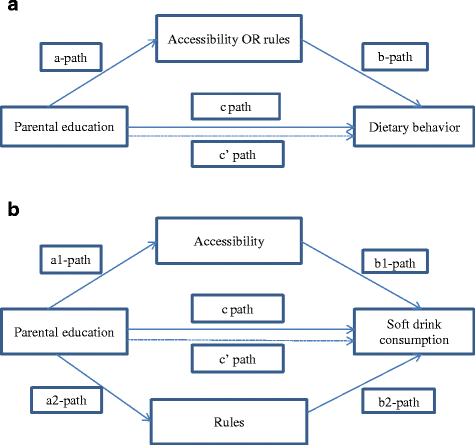Perceived rules and accessibility: measurement and mediating role in the association between parental education and vegetable and soft drink intake
- PMID: 27530159
- PMCID: PMC4987975
- DOI: 10.1186/s12937-016-0196-3
Perceived rules and accessibility: measurement and mediating role in the association between parental education and vegetable and soft drink intake
Abstract
Background: The existence of socioeconomic differences in dietary behaviors is well documented. However, studies exploring the mechanisms behind these differences among adolescents using comprehensive and reliable measures of mediators are lacking. The aims of this study were (a) to assess the psychometric properties of new scales assessing the perceived rules and accessibility related to the consumption of vegetables and soft drinks and (b) to explore their mediating role in the association between parental education and the corresponding dietary behaviors.
Methods: A cross-sectional survey including 440 adolescents from three counties in Norway (mean age 14.3 years (SD = 0.6)) was conducted using a web-based questionnaire. Principal component analysis, test-retest and internal reliability analysis were conducted. The mediating role of perceived accessibility and perceived rules in the association between parental education and the dietary behaviors was explored using linear regression analyses.
Results: Factor analyses confirmed two separate subscales, named "accessibility" and "rules", both for vegetables and soft drinks (factor loadings >0.60). The scales had good internal consistency reliability (0.70-0.87). The test-retest reliability of the scales was moderate to good (0.44-0.62). Parental education was inversely related to the consumption of soft drinks and positively related to the consumption of vegetables. Perceived accessibility and perceived rules related to soft drink consumption were found to mediate the association between parental education and soft drink consumption (47.5 and 8.5 % of total effect mediated). Accessibility of vegetables was found to mediate the association between parental education and the consumption of vegetables (51 % of total effect mediated).
Conclusion: The new scales developed in this study are comprehensive and have adequate validity and reliability; they are therefore considered appropriate for use among 13-15 year-olds. Parents, in particular those with a low educational background, should be encouraged to increase the accessibility of vegetables and to decrease the accessibility of soft drinks, in particular during dinner. Enforcing parental rules limiting soft drink intake in families with low parental education also appears relevant.
Keywords: Adolescents; Mediation; Parental education; Socioeconomic differences; Soft drinks; Vegetables.
Similar articles
-
Mediators of parental educational differences in the intake of carbonated sugar-sweetened soft drinks among adolescents, and the moderating role of neighbourhood income.Nutr J. 2023 Sep 11;22(1):43. doi: 10.1186/s12937-023-00872-7. Nutr J. 2023. PMID: 37697383 Free PMC article.
-
The relationship between parental education and adolescents' soft drink intake from the age of 11-13 years, and possible mediating effects of availability and accessibility.Br J Nutr. 2013 Sep 14;110(5):926-33. doi: 10.1017/S0007114512005946. Epub 2013 Feb 4. Br J Nutr. 2013. PMID: 23375110
-
Adolescent impulsivity and soft drink consumption: The role of parental regulation.Appetite. 2016 Jan 1;96:432-442. doi: 10.1016/j.appet.2015.09.040. Epub 2015 Oct 9. Appetite. 2016. PMID: 26456410
-
Screen-based sedentary time: Association with soft drink consumption and the moderating effect of parental education in European children: The ENERGY study.PLoS One. 2017 Feb 9;12(2):e0171537. doi: 10.1371/journal.pone.0171537. eCollection 2017. PLoS One. 2017. PMID: 28182671 Free PMC article.
-
Determinants of soft drink consumption among children and adolescents in developed countries - a systematic review.Cent Eur J Public Health. 2021 Dec;29(4):290-300. doi: 10.21101/cejph.a6755. Cent Eur J Public Health. 2021. PMID: 35026068
Cited by
-
Can food parenting practices explain the association between parental education and children's food intake? The Feel4Diabetes-study.Public Health Nutr. 2022 Apr 13;25(10):1-14. doi: 10.1017/S1368980022000891. Online ahead of print. Public Health Nutr. 2022. PMID: 35416142 Free PMC article.
-
Mediators of parental educational differences in the intake of carbonated sugar-sweetened soft drinks among adolescents, and the moderating role of neighbourhood income.Nutr J. 2023 Sep 11;22(1):43. doi: 10.1186/s12937-023-00872-7. Nutr J. 2023. PMID: 37697383 Free PMC article.
-
Adolescent vegetable consumption: the role of socioemotional family characteristics.Public Health Nutr. 2021 Dec;24(17):5710-5719. doi: 10.1017/S1368980021001658. Epub 2021 Apr 16. Public Health Nutr. 2021. PMID: 33858557 Free PMC article.
-
Intake of Sugar-Sweetened Beverages in Adolescents from Troms, Norway-The Tromsø Study: Fit Futures.Nutrients. 2019 Jan 22;11(2):211. doi: 10.3390/nu11020211. Nutrients. 2019. PMID: 30678146 Free PMC article.
-
Inequalities in cardiovascular risks among Swedish adolescents (ABIS): a prospective cohort study.BMJ Open. 2020 Feb 20;10(2):e030613. doi: 10.1136/bmjopen-2019-030613. BMJ Open. 2020. PMID: 32086351 Free PMC article.
References
Publication types
MeSH terms
LinkOut - more resources
Full Text Sources
Other Literature Sources


